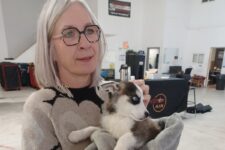THUNDER BAY – The federal government is committing an additional $1.5 million to extend the Matawa Animal Services pilot project from two years to four, Indigenous Services Minister Patty Hajdu announced Friday.
Matawa First Nations Management has demonstrated “exemplary leadership” with the project to create healthier, safer communities for companion animals and the people who love them, Hajdu said in a news conference in a North Star Air hangar at Thunder Bay International Airport.
One accomplishment of the pilot project launched in February was offering spay, neuter and animal wellness clinics in First Nations served by Matawa. The reserves had not seen such clinics in many years, according to a Matawa news release.
A lack of veterinarians in remote First Nations has spawned a range of problems including poor animal health, dog overpopulation and increased disease transmission among animals, according to the release.
Matawa chiefs are developing a business plan to expand the pilot project to serve other First Nations who lack access to veterinary services, animal supplies and resources, said David Paul Achneepineskum, chief executive officer of Matawa First Nations Management.
Achneepineskum said Matawa “is proud to be a trailblazer in Canada on the long-ignored issue of connecting the health of animals to the health of the people in First Nations.
“Access to animal services is critical in ensuring our communities are safe places,” he said.
“Also, our relationship to dogs has been disrupted by colonization and we need to fix that in a sustainable way.
“We are grateful for the support and responsibility taken by the federal government and look forward to the same with the provincial government.”
Hajdu said “dog rescue” work in First Nations “is a Band-Aid solution at best.”
Having to surrender pets due to lack of financial resources and lack of veterinary services nearby “creates a lot of pain for people who love their animals,” she said.
“So this (pilot project) tries to change that relationship with communities by empowering those communities to have the self-determination, to have an animal care coordinator, to be able to connect with vets and the vet services that can come in on a rotating basis,” she continued.
Connecting communities to vital animal services helps “keep animals healthy and ultimately keep the wellness of communities intact,” she said.




